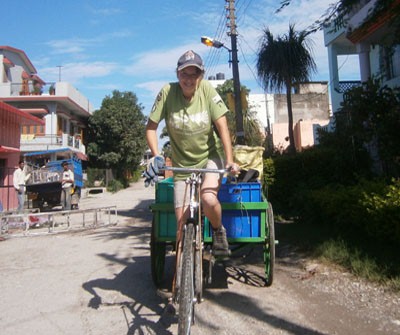
Jodie Underhill, the founder of the Mountain Cleaners was born in 1976 in Great Yarmouth, England. She is a committed environmentalist who enjoys world travel, fundraising, event organising and challenges. Previous jobs in the UK include legal editor, fundraising assistant, volunteer co-ordinator and carer for the elderly and people with spinal injuries.
Jodie Underhill wanted to come to India for as long as she can remember. The 37 year old finally made it in 2008. After traveling for some time, she became a volunteer at the Tibetan children`s village in Dharamsala only to find out that there`s a big problem out here.
`The garbage discarded everywhere troubled me every single day of my journey across India, so when I finished volunteering I decided to do something about it,` says Jodie, who grew up in Yorkshire wanting to be a jockey when she was older.
In a few days, she began gathering groups of people to clean up McLeod Ganj in Himachal Pradesh, where the spiritual leader Dalai Lama lives. Like minded people joined hands and formed a voluntary organisation with a mission to rid the hills of waste. Though it wasn`t easy to start with, by now thousands of volunteers have helped out.
Jodie and the team cleaned up beaches in Goa and managed waste at the Sunburn music festival before moving to Dehradun in 2012 to set up Waste Warriors, a registered society which takes up cleaning drives, training programs on waste management, consultancy services and waste management at events.
The plan is to scale up their activities all over India and also help municipalities and panchayats sort out their waste problem.
Unlike many of us, Jodie is painfully aware of the problems around her. `Just look around you,` she says. `The government is running out of places to create landfills and everyday 1,000 Indian children die from drinking dirty water. Everyone is affected by the filth that litters the streets and pollutes waterways,` she adds.
Collecting the waste is just one part of the problem. The bigger problem is to figure out what to do with it.
In Dharamsala for instance, the waste from their dustbins, clean up hikes and collection service is segregated and sent for recycling. Non-recyclable waste is put into the town`s waste containers to be taken to a dumpsite in lower Dharamsala. `We collect even low value items such as broken glass (half rupee per kg) and sell what is considered to be non-recyclable plastic ie biscuit and chip wrappers to the Public Works Department for Rs 3 per kg,` said Jodie. The PWD uses this plastic by adding it to the tarmac when making roads.
It`s a tough journey, but one which she is determined to carry on with. `My motivation and inspiration comes from my love for India and a strong belief that change is possible,` she says. That love, is something, even staunch Indians fail to translate into action. We wish her luck in her journey.
Some inspirational video clips of Jodie:

